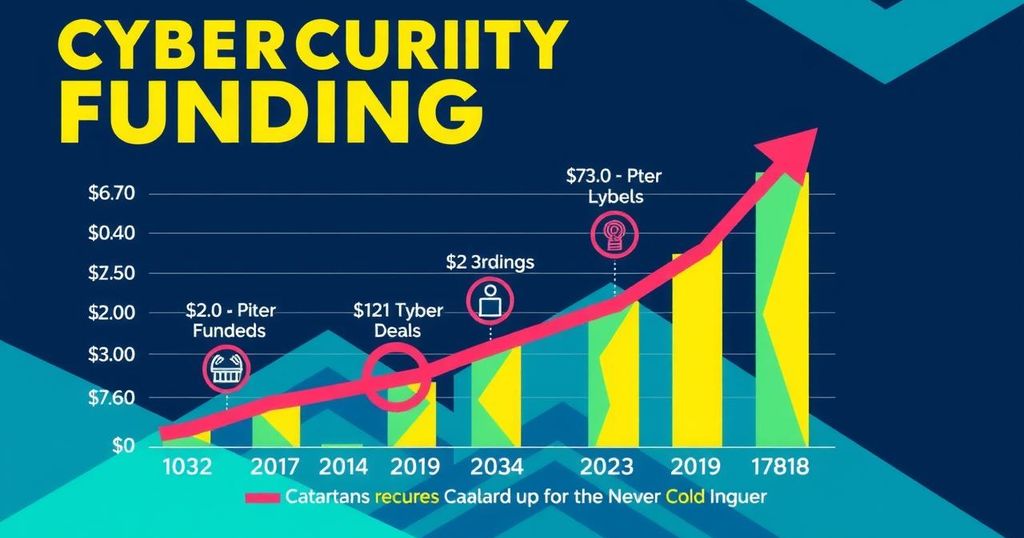Cybersecurity Investment Bounces Back Despite Deal Drought in 2024
In 2024, cybersecurity venture investments surged 43% to nearly $11.6 billion, driven by significant rounds despite flat funding in Q4 and fewer overall deals. Notable mega-deals included Wiz’s $1 billion funding round. However, the number of deals dropped sharply, raising concerns about the sustainability of funding and the impact on numerous startups as investors increasingly pivot to AI.
In an impressive rebound, cybersecurity venture investments soared by 43% in 2024 compared to 2023, driven by some hefty funding rounds. This resurgence comes despite an overall stagnation in funding during the last quarter of the year and a notable drop in the number of deals. According to Crunchbase data, VC-backed cybersecurity startups raked in nearly $11.6 billion last year, a significant uptick from the $8.1 billion secured in 2023 but still far from the peak of $17 billion reached in 2022.
It’s a curious climate for cybersecurity funding—while the dollars are indeed flowing, the number of deals has taken a dive. Just 639 rounds were completed in 2024, reflecting a steep 22% decrease from the previous year and a steep 37% fall from 2022. Investors seem to be placing larger bets on fewer companies, as evidenced by the surge in mega-rounds.
Notably, the cybersecurity sector saw 29 rounds of funding exceeding $100 million, a jump from only 18 rounds in 2023. Among these big deals stood out the cloud security startup Wiz, which landed the largest round of the year with a whopping $1 billion at a valuation of $12 billion. This significant funding came right at the start of the RSA Conference in San Francisco in May and was jointly backed by notable firms like Andreessen Horowitz, Lightspeed Venture Partners, and Thrive Capital.
Also making waves was the France-based I-Tracing, a managed security service provider that pulled in around $516 million in June this year, marking it as a major player in the cybersecurity market. Meanwhile, in August, Kiteworks raised $456 million, with Insight Partners and Sixth Street leading the charge, indicating their minority investment suggests a valuation of over $1 billion.
However, the final stretch of 2024 wasn’t particularly dazzling for funding figures, as the last quarter recorded around $2.2 billion invested across 124 deals, remaining mostly flat compared to the previous quarter. Still, it marked a 29% rise from Q4 2023, which saw $1.7 billion funneled into 170 rounds, hinting at some cautious optimism.
Among the big deals in Q4, SandboxAQ brought in over $300 million at a valuation exceeding $5.6 billion—putting quantum technology and AI in the spotlight. In November, New York’s Cyera closed a massive $300 million Series D, boosting its valuation to $3 billion. Just a few months prior, they had successfully raised another $300 million at a much lower valuation of $1.4 billion—now that’s quite a leap!
So, what does all this mean for the future? Even though the year-over-year figures seem robust, looming issues threaten the cybersecurity funding landscape. The slow deal flow—marked as the seventh consecutive quarter of decline—suggests an alarming trend. While large investments are being channeled into a select few firms, many startups are left out in the cold without funding opportunities, which could lead some to dangerous crossroads.
Investors might be increasingly drawn to AI, which has dominated the funding landscape recently, potentially pushing cybersecurity ventures further down the priority list. This shift could result in difficult fundraising conditions for cybersecurity startups, especially those without an AI angle to entice venture capitalists.
Whichever way you slice it, one thing is clear: funding for cybersecurity companies is drying up, which could create a storm for founders seeking cash in the year ahead. It’s a thrilling yet precarious time in the cyber world, as fortunes favor the brave, but many may soon find themselves without a lifeline if trends don’t shift.
To sum up, while cybersecurity venture investments have made an impressive comeback in 2024, there are troubling signs with decreased deal activity and a shift of investor focus toward AI. Heavy investments are pouring into select players, but many startups risk falling through the cracks as they scramble for cash. The impending challenges could spell trouble for those looking to secure funding in 2025.
Original Source: news.crunchbase.com




Post Comment